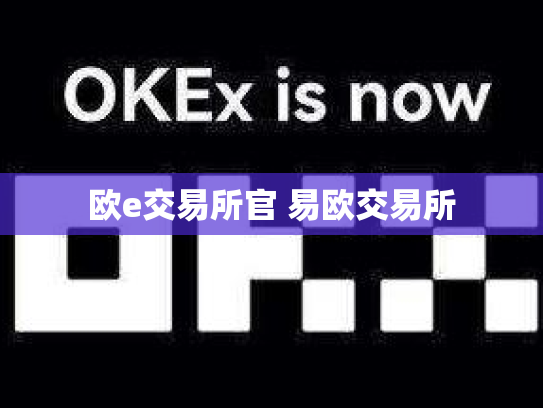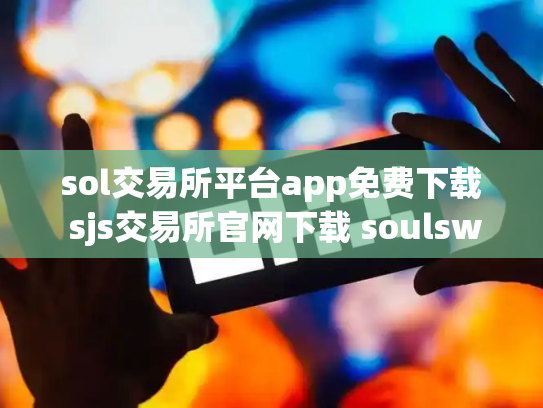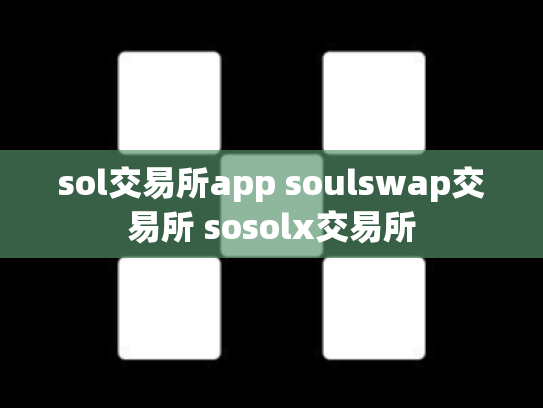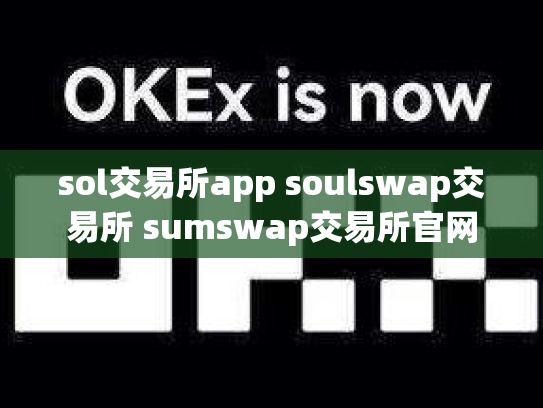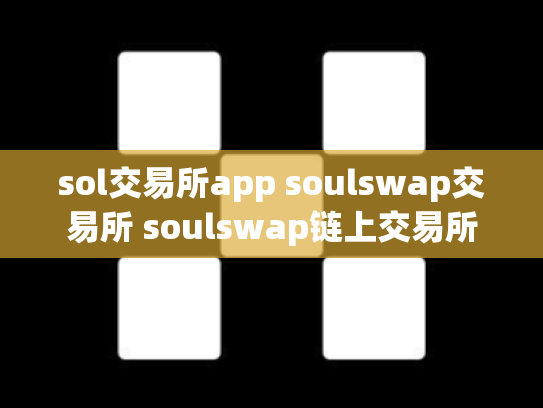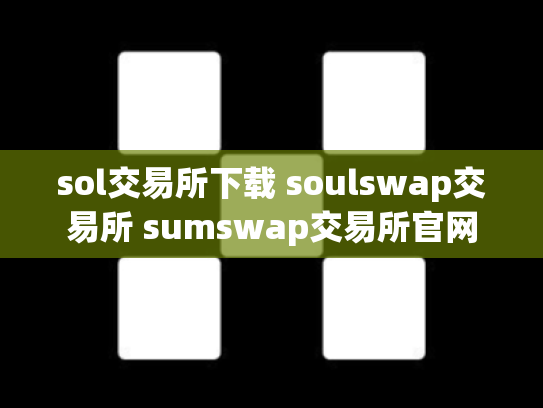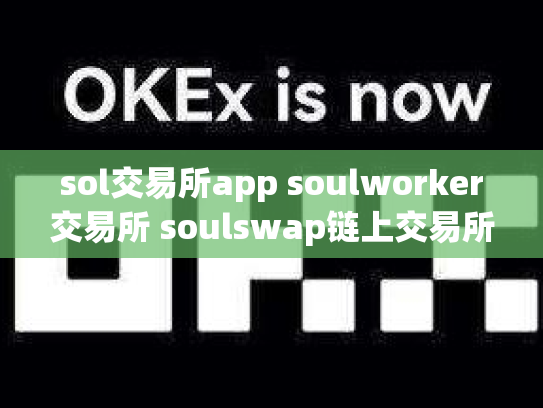SoulSwap是一个基于以太坊的去中心化交易所,它允许用户通过交换虚拟货币来实现自我价值增值,与传统的交易所不同,SoulSwap不依赖于中央机构进行交易,而是依靠智能合约和社区治理机制确保公平性和透明度,用户可以在SoulSwap平台上购买、出售或持有各种加密货币,并且可以利用其流动性挖矿功能赚取代币奖励,SoulSwap还支持跨链功能,使用户能够更方便地在不同的区块链网络之间移动资产,该平台以其去中心化、安全性高和用户体验好而受到广泛关注。
SoulSwap Chain-2-1 Exchange: Unlocking the Future of Decentralized Finance
目录导读:
-
Introduction to SoulSwap
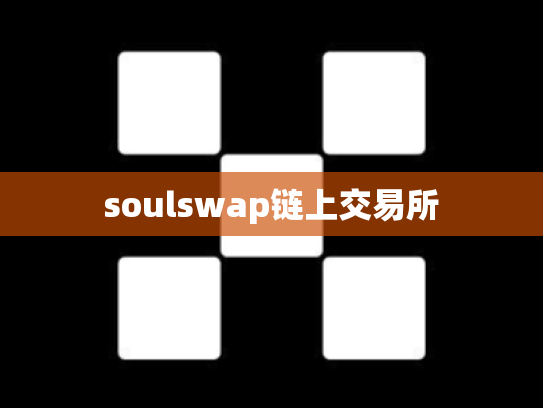
-
What is Chain-2-1?
-
How Does SoulSwap Work?
-
Benefits of Using SoulSwap for Chain-2-1 Transactions
-
Potential Applications in Decentralized Finance
-
Challenges and Considerations
-
Conclusion
Introduction to SoulSwap
SoulSwap is an innovative chain-based exchange that allows users to swap assets directly on-chain using their digital signatures instead of relying on centralized intermediaries like banks or exchanges. This approach aims to provide greater transparency, security, and decentralization compared to traditional financial systems.
The SoulSwap platform operates within its own blockchain network, ensuring all transactions are conducted securely without the risk associated with third-party involvement. By leveraging advanced cryptographic techniques, SoulSwap ensures that each transaction is verified and executed accurately.
What is Chain-2-1?
Chain-2-1 refers to the idea of moving beyond current blockchain technology limitations, such as scalability issues and limited functionality. By introducing new layers or upgrades to existing blockchains, developers aim to create more efficient, flexible, and user-friendly platforms.
In the context of decentralized finance (DeFi), this could involve enhancing the performance and usability of Ethereum, one of the most prominent DeFi platforms. Innovators like SoulSwap are exploring ways to integrate emerging technologies into existing blockchain networks to unlock new opportunities for financial innovation.
How Does SoulSwap Work?
To understand how SoulSwap functions, let's break down its key components:
-
On-Chain Trading: Users can engage in direct asset swaps through their wallets, eliminating the need for intermediary exchanges.
-
Decentralized Governance: The SoulSwap protocol allows community members to participate in governance decisions related to the exchange's operations and improvements.
-
Smart Contracts: Automates critical parts of the trading process, reducing human error and increasing efficiency.
By combining these elements, SoulSwap provides a seamless, secure, and transparent way for users to conduct transactions across various blockchain networks.
Benefits of Using SoulSwap for Chain-2-1 Transactions
Using SoulSwap for chain-2-1 transactions offers several advantages over traditional methods:
-
Security: By executing transactions directly on the blockchain, there is no middleman involved, significantly lowering the risk of fraud or manipulation.
-
Scalability: With improved infrastructure, SoulSwap enables faster and smoother execution of complex trades, addressing common scalability concerns faced by many blockchain projects.
-
Transparency: All transactions are recorded on the blockchain, providing a permanent record of every trade made, which enhances trust among users and improves accountability.
-
Accessibility: Users can access these services via their web browsers, smartphones, or other devices, making it easier for everyone to participate in the evolving world of decentralized finance.
Potential Applications in Decentralized Finance
Beyond just swapping assets between different blockchain networks, SoulSwap has the potential to revolutionize various aspects of decentralized finance:
-
Cross-Chain Asset Swaps: Facilitating the transfer of assets from one blockchain to another seamlessly.
-
Liquidity Mining: Rewarding users who help maintain liquidity in the exchange, encouraging participation and fostering growth.
-
Tokenomics Management: Offering tools for managing token distributions and rewards effectively.
These applications not only enhance the capabilities of DeFi but also pave the way for even more innovative solutions in the future.
Challenges and Considerations
While SoulSwap presents numerous benefits, implementing such a system comes with its own set of challenges:
-
Technical Complexity: Developing robust smart contracts and ensuring they operate smoothly requires careful engineering and testing.
-
Regulatory Compliance: Ensuring compliance with local regulations and international standards poses significant hurdles.
-
Market Adoption: Gaining widespread adoption among users and investors remains a challenge, especially considering the initial setup cost required for participating in the SoulSwap ecosystem.
Conclusion
As we continue to see advancements in blockchain technology, platforms like SoulSwap represent exciting developments in the realm of decentralized finance. By bridging the gap between traditional financial systems and cutting-edge blockchain innovations, SoulSwap sets the stage for a future where financial transactions become not only faster and cheaper but also more accessible and trustworthy.
With ongoing research and development, SoulSwap continues to evolve, promising to redefine what is possible in the world of financial markets. Stay tuned as this pioneering project pushes boundaries and opens up new avenues for global financial inclusion and collaboration.
